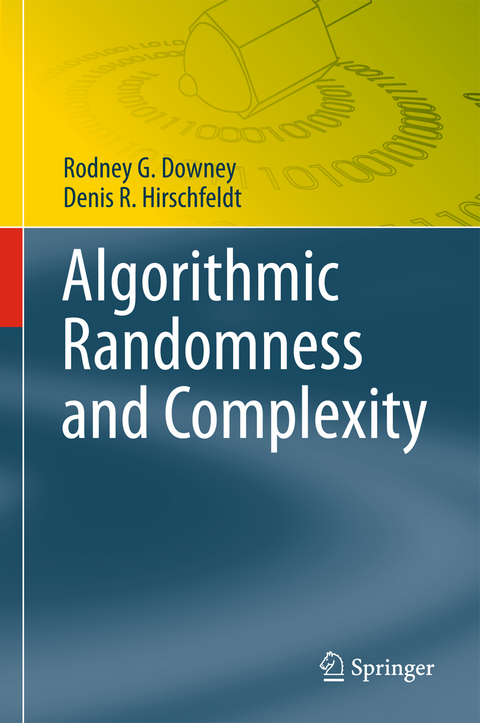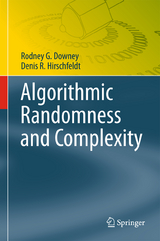Algorithmic Randomness and Complexity
Seiten
2010
Springer-Verlag New York Inc.
978-0-387-95567-4 (ISBN)
Springer-Verlag New York Inc.
978-0-387-95567-4 (ISBN)
The theory of algorithmic randomness uses tools from computability theory and algorithmic information theory to address questions such as these. It will be of interest to researchers and students in computability theory, algorithmic information theory, and theoretical computer science.
Intuitively, a sequence such as 101010101010101010… does not seem random, whereas 101101011101010100…, obtained using coin tosses, does. How can we reconcile this intuition with the fact that both are statistically equally likely? What does it mean to say that an individual mathematical object such as a real number is random, or to say that one real is more random than another? And what is the relationship between randomness and computational power. The theory of algorithmic randomness uses tools from computability theory and algorithmic information theory to address questions such as these. Much of this theory can be seen as exploring the relationships between three fundamental concepts: relative computability, as measured by notions such as Turing reducibility; information content, as measured by notions such as Kolmogorov complexity; and randomness of individual objects, as first successfully defined by Martin-Löf. Although algorithmic randomness has been studied for several decades, a dramatic upsurge of interest in the area, starting in the late 1990s, has led to significant advances. This is the first comprehensive treatment of this important field, designed to be both a reference tool for experts and a guide for newcomers. It surveys a broad section of work in the area, and presents most of its major results and techniques in depth. Its organization is designed to guide the reader through this large body of work, providing context for its many concepts and theorems, discussing their significance, and highlighting their interactions. It includes a discussion of effective dimension, which allows us to assign concepts like Hausdorff dimension to individual reals, and a focused but detailed introduction to computability theory. It will be of interest to researchers and students in computability theory, algorithmic information theory, and theoretical computer science.
Intuitively, a sequence such as 101010101010101010… does not seem random, whereas 101101011101010100…, obtained using coin tosses, does. How can we reconcile this intuition with the fact that both are statistically equally likely? What does it mean to say that an individual mathematical object such as a real number is random, or to say that one real is more random than another? And what is the relationship between randomness and computational power. The theory of algorithmic randomness uses tools from computability theory and algorithmic information theory to address questions such as these. Much of this theory can be seen as exploring the relationships between three fundamental concepts: relative computability, as measured by notions such as Turing reducibility; information content, as measured by notions such as Kolmogorov complexity; and randomness of individual objects, as first successfully defined by Martin-Löf. Although algorithmic randomness has been studied for several decades, a dramatic upsurge of interest in the area, starting in the late 1990s, has led to significant advances. This is the first comprehensive treatment of this important field, designed to be both a reference tool for experts and a guide for newcomers. It surveys a broad section of work in the area, and presents most of its major results and techniques in depth. Its organization is designed to guide the reader through this large body of work, providing context for its many concepts and theorems, discussing their significance, and highlighting their interactions. It includes a discussion of effective dimension, which allows us to assign concepts like Hausdorff dimension to individual reals, and a focused but detailed introduction to computability theory. It will be of interest to researchers and students in computability theory, algorithmic information theory, and theoretical computer science.
Background.- Preliminaries.- Computability Theory.- Kolmogorov Complexity of Finite Strings.- Relating Complexities.- Effective Reals.- Notions of Randomness.- Martin-Löf Randomness.- Other Notions of Algorithmic Randomness.- Algorithmic Randomness and Turing Reducibility.- Relative Randomness.- Measures of Relative Randomness.- Complexity and Relative Randomness for 1-Random Sets.- Randomness-Theoretic Weakness.- Lowness and Triviality for Other Randomness Notions.- Algorithmic Dimension.- Further Topics.- Strong Jump Traceability.- ? as an Operator.- Complexity of Computably Enumerable Sets.
| Erscheint lt. Verlag | 5.11.2010 |
|---|---|
| Reihe/Serie | Theory and Applications of Computability |
| Zusatzinfo | XXVIII, 855 p. |
| Verlagsort | New York, NY |
| Sprache | englisch |
| Maße | 155 x 235 mm |
| Themenwelt | Informatik ► Theorie / Studium ► Algorithmen |
| Mathematik / Informatik ► Mathematik ► Analysis | |
| Mathematik / Informatik ► Mathematik ► Wahrscheinlichkeit / Kombinatorik | |
| ISBN-10 | 0-387-95567-4 / 0387955674 |
| ISBN-13 | 978-0-387-95567-4 / 9780387955674 |
| Zustand | Neuware |
| Informationen gemäß Produktsicherheitsverordnung (GPSR) | |
| Haben Sie eine Frage zum Produkt? |
Mehr entdecken
aus dem Bereich
aus dem Bereich
Buch | Softcover (2024)
Lehmanns Media (Verlag)
CHF 55,95
Buch | Softcover (2022)
Manning Publications (Verlag)
CHF 79,95
how metrics are transforming the work of journalists
Buch | Softcover (2024)
Princeton University Press (Verlag)
CHF 33,15




